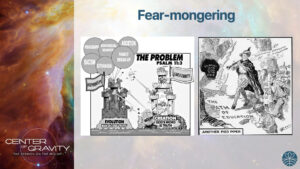
In this sermon, Pastor T. C. Moore explores the contrasting motivations of fear-based obedience and love-based obedience, using the Sermon on the Mount as a lens to understand Jesus’s teachings. The message begins with a reflection on old Fundamentalist political cartoons, which often used fear to enforce rigid moral behaviors. This serves as an entry point to a broader conversation about how fear-based frameworks of faith distort the message of Jesus.
He shares a personal story about growing up with a schizophrenic single mother and fundamentalist extended family members. Despite experiencing poverty and abuse, the family’s focus was not on providing support but on blaming societal issues—like crime and family breakdown—on belief in evolution rather than creationism. This upbringing revealed the harm caused by fear-mongering and rigid doctrine, a lesson he revisits in light of Jesus’s teachings.
The Sermon on the Mount (Matthew 5–7), described as the cornerstone of Jesus’s teachings, challenges fear-based obedience. In particular, Pastor T. C. focuses on passages dealing with adultery, divorce, oaths, revenge, and loving one’s enemies (Matthew 5:27–48). Rather than presenting a list of impossible moral standards, Jesus invites his followers into a developmental journey toward wholeness and maturity—obedience motivated by love.
The Greek word plēroō, often translated as “fulfill,” is reexamined. It conveys the idea of a process of filling to the full, which reframes Jesus’s declaration in Matthew 5:17 that he came to “fulfill” the Law and Prophets. This interpretation connects to Jesus’s call to “be perfect, as your heavenly Father is perfect” (Matthew 5:48). The word “perfect,” derived from the Greek teleios, does not mean flawlessness but spiritual maturity, wholeness, and integration.
Pastor T. C. critiques interpretations that view Jesus’s teachings as stricter than the Pharisees’ legalism or as a “fence around the Torah.” These views reduce faith to sin management and fear of punishment. Instead, Jesus’s call to integrity flows from love. For example:
- Honoring marital commitments is rooted in loving one’s spouse as oneself.
- Telling the truth reflects love for one’s neighbor.
- Turning the other cheek demands love that humanizes even one’s oppressors.
- Loving enemies demonstrates love for God, who created all people.
This emphasis on love is central to the life of faith. Pastor T. C. reflects on the church’s affirming stance toward LGBTQ+ inclusion, challenging the slippery-slope fear tactics often used to police behavior. Instead of rigid rules, the church models love and maturity as the foundation of faith.
The sermon concludes by inviting listeners to embrace the freedom of living out love-based obedience. Faith is not about avoiding sin to escape punishment but about growing in love, integrity, and spiritual maturity with the guidance of the Spirit. Jesus’s teachings call us into a journey of becoming—becoming whole, loving as God loves, and living in grace.







